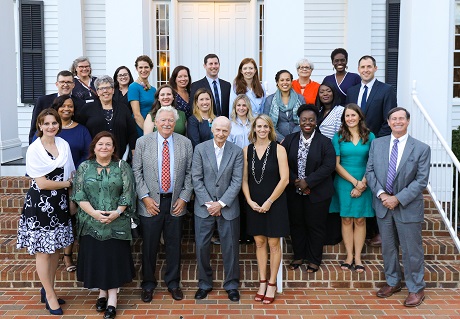Riley Institute announces afterschool and expanded learning policy fellows
The Riley Institute at Furman University has selected 16 leaders in the field of afterschool and expanded learning to participate in the White-Riley-Peterson (WRP) Policy Fellowship. The new class of WRP Fellows will travel to Greenville in October to begin the program.
“I am so proud to welcome 16 more leaders to this outstanding program,” said former U.S. Secretary of Education Richard W. Riley. “It is so important for young people to have access to high-quality academic enrichment opportunities during afterschool hours and in the summer – and we need policy leaders who can make that happen.”

2018 White-Riley-Peterson Policy Fellows
Funded by the Charles Stewart Mott Foundation, the WRP Fellowship is a 10-month, national program designed to equip graduates with a real-world understanding of policymaking for afterschool and expanded learning. Over the course of a year, WRP Fellows study an intensive policy curriculum, learn from policy experts and benefit from national networking opportunities. This will include working with the Afterschool Alliance, a national advocacy organization, as well as the Mott Foundation’s 50-state afterschool network.
WRP Fellows are expected to complete the program with newfound expertise to help inform and advocate policies that support afterschool and summer learning opportunities for children across the country. They put these new skills to use by developing and implementing afterschool-related policy projects in their home states.
“Students who attend afterschool and summer programs are better prepared for work and life. They attend school more, make gains in reading and math, improve their grades and have higher graduation rates,” said Cathy Stevens, director of the White-Riley-Peterson Policy Fellowship.
According to the national Afterschool Alliance, over 10 million children in America participate in afterschool programs, but more than 19 million additional children would participate if programs were available.
The 2019-2020 WRP Policy Fellows are:
- Anna Almerico, Network Lead, Idaho Out-of-School Network (Boise, Idaho)
- Benjamin Baird, Spokane County Program Quality Manager, School’s Out Washington (Spokane, Washington)
- Brent Balog, Community Liaison & Outreach Coordinator, Clackamas Workforce Partnership (Portland, Oregon)
- Tiyana Brown, Charlotte NEXT Director, MeckEd (Charlotte, North Carolina)
- Charmaine Davis-Bey, 21st CCLC Education Program Specialist, Ohio Department of Education (Columbus, Ohio)
- Robert Dorigo Jones, Policy and Outreach Associate, Michigan’s Children (Lansing, Michigan)
- Kate Foster, Program Coordinator, Wyoming Afterschool Alliance (Laramie, Wyoming)
- Tyneisha Gibbs, Director of Expanded Learning Opportunities, NJSACC (Westfield, New Jersey)
- Brandon Hutton, Research Project Coordinator, Kansas Enrichment Network (Lawrence, Kansas)
- Jeff McConaughy, Director of Policy and Communications, New Mexico Out-of-School Time Network (Albuquerque, New Mexico)
- Heather May, AmeriCorps VISTA, Maryland Out of School Time Network (Baltimore, Maryland)
- Kate-Marie Roycroft, Director of Public Policy, The Alliance of Massachusetts YMCAs (Boston, Massachusetts)
- Rev. John Unger II, West Virginia State Senator and President of GRaCE Company (Harpers Ferry, West Virginia)
- Zong Vang, Strategy Manager Policy and Network Evaluation, Ignite Afterschool with Sprockets (St. Paul, Minnesota)
- Shawna Viola, Research and Evaluation Specialist, Connecticut After School Network (Branford, Connecticut)
- Heather Williams, Program Director, Policy and Outreach, California Afterschool Network (Sacramento, California)
The number of Fellows nationwide has grown to 122 in 49 states since the initiative launched in 2012. Projects completed by WRP Fellows have improved afterschool quality standards, introduced legislation in support of afterschool, and led to increased capacity in programming in their home states.
The WRP Policy Fellowship is named for Riley and for William S. White, chairman of the board of trustees of the Charles Stewart Mott Foundation, and for Terry Peterson, national board chair of the Afterschool Alliance and senior fellow at the Riley Institute and the College of Charleston.
For more information, contact Cathy Stevens at 864-294-3265, and cathy.stevens@furman.edu.
About the Riley Institute at Furman University
Furman University’s Richard W. Riley Institute broadens student and community perspectives about issues critical to South Carolina’s progress. It builds and engages present and future leaders, creates and shares data-supported information about the state’s core challenges, and links the leadership body to sustainable solutions. It is committed to nonpartisanship in all it does and to a rhetoric-free, facts-based approach to change. Learn more at riley.furman.edu.
About the Charles Stewart Mott Foundation
Established in 1926 in Flint, Michigan, by an automotive pioneer, the Charles Stewart Mott Foundation is a private philanthropy committed to supporting projects that promote a just, equitable and sustainable society. It supports nonprofit programs throughout the United States and abroad. Grantmaking is focused in four categories: Civil Society, Education, Environment and Flint Area. In addition to Flint, offices are located in metropolitan Detroit, Johannesburg and London. With year-end assets of approximately $3 billion in 2018, the Foundation made 358 grants totaling more than $132 million. For more information, visit www.mott.org.